Rick Wayne's Blog, page 7
February 10, 2021
(Art) The Retrofuture Noir of Tim Razumovsky

“Aurora Noir” is a retrofuturist image series by Tel Aviv digital artist Tim Razumovsky. With art deco robots, cyborg private detectives, an automaton jazz orchestra, and monumental public works, it’s like Blade Runner if Blade Runner had been written in 1930.
Find more by the artist here.

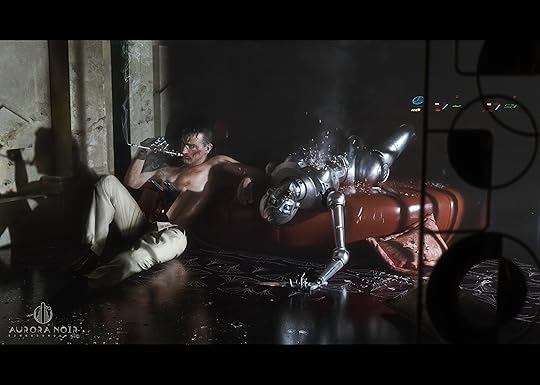
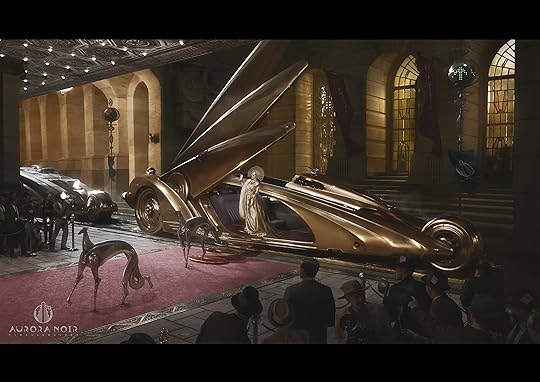
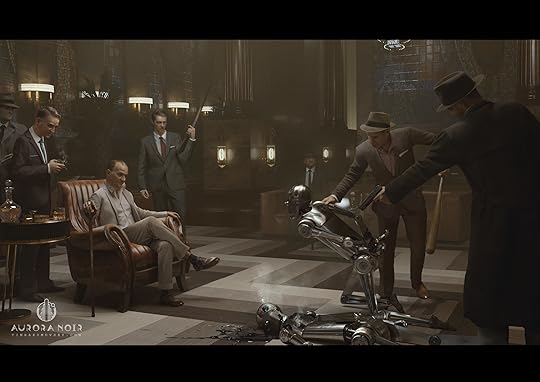

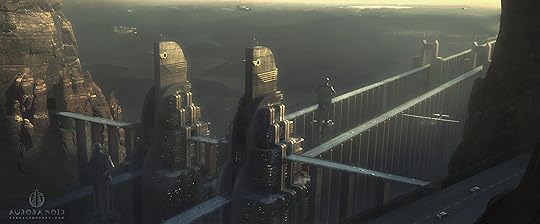
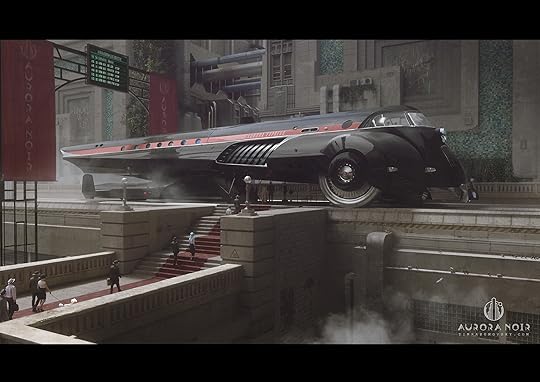



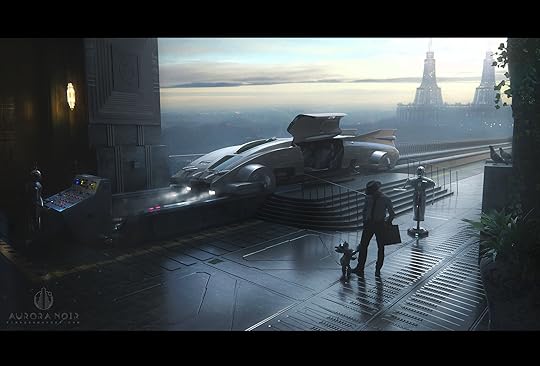
February 9, 2021
(Fiction) Evidence
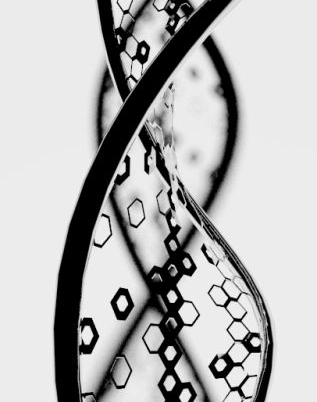
No one on the street noticed the man with the backpack as he strolled up the steps to the government building. No one turned as he held the door for a young PhD candidate and her friends, who stumbled out laughing and joking derisively at her newly minted license. No one moving through the foyer glanced at him as he answered a brief series of questions at an automated kiosk and pulled a slip of paper from the side. No one stopped him as he passed to the waiting area, visible just beyond a glass barrier. The guards barely registered his face as they checked his ID and asked him to step through a scanner. When it glitched momentarily, they asked him to move aside, which he did without objection while his backpack was sent through a second, smaller device. When the light at the top turned green, the man collected his bag and took a seat under the circular seal that hung on the wall. The words SCIENCE CONTROL AGENCY curved in block chrome letters around the matching icon at the center.
After several minutes, a loud beep preceded a calm automated voice, which spoke the words “A36. Now serving A36 at cubicle number 4.” The man checked the number printed on the slip of paper to make sure he had remembered it correctly. Then he rose and made his way at an even pace to a painted walkway that branched into colored paths, each marked by a different number. Each path led to a glass-walled cubicle, from which the whole of the hall was openly visible. Everything smelled new.
Cubicle 4 held two chairs, one each on either side of a plank-desk that jutted from the wall. There was no computer. Any part of the glass could be turned into a touchscreen, as the officer behind the desk was demonstrating. She typed on the desk, where an optical keyboard was projected, and greeted the man without turning from the multiple displays in the otherwise clear wall next to her.
“Have a seat, sir.”
The man sat down and set his backpack next to the chair.
“What can I do for you?” The woman’s name tag said SHIRLEY.
“I want you to arrest me.”
“Arrest you?” she asked, completely unperturbed. “What for?”
“I killed the president. And several others, actually. But that’s the most important.”
“Mm-hmm,” she replied without turning from her report. “And when did you do that?”
“I shot the president a couple years ago,” he explained. “But it was in 1963.”
She glanced him over quickly before resuming her typing. Her nails clack-clacked on the desk. “You know what year it is, right?”
“Yes, of course I do.”
“You look pretty good for a hundred-and-some-year-old man.”
“I’m no older than I look.”
“So you went back in time, is that it? Your name Lee Harvey Oswald?”
“No, it’s Jones. And yes, I did. I can prove it.”
The man reached into his backpack and set a clear plastic disc on the desk. What looked like a tiny piece of chewed gum, no larger than a printed period, was sealed inside.
She looked at it skeptically. “What’s this?”
“It’s a piece of the president’s brain. Preserved in epoxy.”
Shirley stared. “Brain?”
“Yes. They had me take the whole thing, but not until 1966, after everything had calmed down. I suspect it would’ve eventually revealed something incriminating. In the future, I mean. But I can’t be sure.”
“And you saved a piece?”
“Yes, well, that’s sort of their fault, isn’t it? If they had done things right the first time, there would’ve been no need to send me back. It occurred to me then that that was the first time I had touched anything that could be authenticated and that I might benefit from a bit of insurance. Just in case.”
“In case of what?”
“In case I needed it.”
“And what exactly are we supposed to do with part of someone’s brain?”
“It’s easy enough for your scientists to determine if it’s human. That would be your first clue that I’m telling the truth. After that, I’d suggest a genetic analysis. The National Archives has a number of the president’s belongings you can use for comparison.”
“Do they now?”
“Yes.”
“And how do you know that?”
“That’s where I got the brain.”
“In 1963?”
“No.” The man smiled patiently, as if he knew he was being tricked. “In ’66.”
“Why not ’63?”
“Because at the time it was still attached to the president. It wasn’t removed until autopsy. We picked the day in ’66 based on an article in the Post. There was a mild brouhaha at the Archives that made a nice cover. You can check that, too.”
“A brouhaha?” Shirley studied him. She swiped her screen closed. “Stay here.”
“Of course,” he said calmly.
After walking a step, she stopped. No way Agent Quinn would believe her. She wouldn’t, if she was him. But she also wasn’t sure what he’d want her to do. It was, after all, only her second week on the job. But Officer Shirley Cisneros, formerly of the Transportation Security Administration, had interviewed hundreds (if not thousands) of people over the course of her career, and there was something about the man sitting calmly at her desk.
She turned and swiped the disc.
“Just a moment,” she said, walking away.
“Of course. Take your time.”
She walked around the glass cubicles to the back, where her biometrics and electronic key card granted her access to a heavy door with guards on both sides. At the end of the T-shaped hall, she turned left and entered the stairwell. One floor down, in the first basement, a set of fire-proofed double doors were painted in two words: CRIMES DIVISION, and she pushed them open.
The raucous rectangular room on the other side was part office, part laboratory, and part mechanic’s garage. Eight desks on an open plan were evenly spaced in two rows, completely circled by the steel cabinets and electronic equipment that lined all four walls. There seemed to be very little organization, and nothing seemed to match, not even the desks. The ceiling was exposed, including the light fixtures and the array of pipes and nozzles that made the fire suppression system. All of the people in the room were engaged, either on the phone or with each other, and no one took any note of Shirley, who began scanning the room for the handsome Orlando Quinn.
“It’s my toaster,” an older woman explained to the nearest Crimes Division agent, a short, stocky woman that Shirley hadn’t met. “It’s become sentient. Or intelligent. I’m not sure which. Perhaps you could explain that,” she suggested earnestly.
“And how do you know that, Mrs. Schnelle?” the agent replied with more than a little disinterest.
“Because it’s an artist.” The elderly woman pulled a large Ziplock bag from her purse. It was full of toast onto which various images had been crudely burned.
Agent Quinn was talking on the phone two desks down.
“Need to talk to you, hoss,” Shirley said to his back.
“Just a sec,” he told her, momentarily covering the receiver. “That’s right,” he continued. Just until tomorrow. We can collect it then.”
Back toward the door, the earnest Mrs. Schnelle was explaining each piece of toast to the stocky agent one at a time. “And you see, this one is the Mona Lisa. And this one is that famous part of the Sistine Chapel where the fingers almost touch. Can you see?”
“Do you have to call me that?” Quinn said to Shirley as he hung up the phone.
“Call you what?”
“Hoss. My grandpa was Mexican, you know.”
“You wanna prize or something?”
“Hey,” the short-haired French officer called from the back. “I got a guy on the line in Albuquerque who says his neighbor was killed by a shape-shifting cyborg who took his place.” She had a strong but clear accent and was dressed, as usual, in a man’s suit with the sleeves rolled.
“Which one is that?” Quinn called back. “Six Billion Dollar Man?”
“Terminator,” a gaunt, bespectacled man corrected from another desk. “Specifically, Terminator 2. 1991. A classic.”
The gaunt man rose to add Terminator to a list on a rolling white board.
“Anybody got a bingo?” he asked. “Clo?”
The French woman at the back checked her card. “Nah. I still need either Alien or The Remnants.”
“How many are we up to?” Quinn asked her.
“Calls? I don’t even know. If you mean warm bodies, eighteen. We’re running out of places to put them.”
“Have you called the county?”
“They already took seven. They’re not taking any more.”
“Where did they come from all of a sudden?” the gaunt man asked. “That’s what I wanna know. Three days ago, this place was dead.”
“I think some members of law enforcement have joined segments of the public in their skepticism of our mission,” Quinn explained.
“Meaning what?”
“Precise rules haven’t been established yet detailing our mandate, so they’re seizing on the moment’s confusion to send us anything and everything that might be remotely related.”
“In other words,” Shirley interjected dryly, “they’re trolling you.”
“I think they would call it hazing,” Quinn corrected.
“What’s the difference?”
“I don’t get it.” The gaunt man walked back to his desk, which bore a sign at the corner: B. KRIPKE, PHD. “Why are we processing them, then, if it’s just a joke?”
“We don’t know that all of them are,” Quinn replied. “Can’t take any chances.”
Dr. Kripke looked toward the door and lowered his voice. “You think toaster lady is serious?”
“Please just process them all correctly. Log the leads. Anyone who’s confessed to a crime needs to see a judge.”
Shirley held out the clear plastic disc before they were interrupted again.
“What’s this?” Quinn asked.
“President Kennedy’s brain. Part of it, anyway.”
“Oh yeah?” Quinn took it with a smile. “What’s this guy’s story?”
“Says he was sent back in time to steal it. Says he’s also the guy who shot Kennedy, but something went wrong and he had to go back for the brain.”
“That’s new.”
“What you want me to tell him?”
Quinn opened his mouth to reply but scowled instead.
“What?” Shirley asked.
“Kripke!” Quinn called.
“Yo!”
“Kennedy’s brain.”
“Missing since 1966. There’s a theory that his brother Robert took it to hide an illness or something, but I don’t believe it.”
Shirley shrugged at Quinn. “So. Man’s done his homework.”
“What does he want?”
“He wants us to arrest him.”
“Tell him we don’t have any evidence, but that we’ll—”
“He says that’s the evidence.” She pointed to the disc in Quinn’s hand. “He said you guys could confirm it was human and do a genetic analysis based off Kennedy’s possessions in the National Archives.”
Quinn paused. “He said that?”
She nodded.
“What’s your take on him?”
“That man is all kinds of strange. You wanna bring him down or not?”
Quinn sighed as the phone on his desk rang again. “Tell him to come back—”
“I’m not telling him anything that might upset him. Man freaks me out. You want him to come back later, you tell him.”
“No!” Mrs. Schnelle shouted. She stood. “I will not! You’re not taking me seriously. I’m telling you—”
“Trade?” Quinn asked.
“Are you suggesting that because of my gender?”
Quinn thought for a moment. “Yes.”
“Why can’t she handle it?” Shirley asked, motioning to the stocky agent doing a terrible job of calming the elderly woman down.
“That’s right,” Quinn said dryly, “you haven’t met Thalia yet.”
Shirley saw the look on his face. She sighed. Orlando Quinn was a six-foot-and-God-knew-how-many-inches gorgeous hunk of man. “Fine. But you do the paperwork for both.”
“Hold on. That’s not fair.”
But Shirley was already interjecting herself into the argument between the other women. Quinn sneaked around her and walked up the stairs to Receiving. But when he got to Shirley’s desk, the man was gone. His backpack sat on the floor, leaning against the chair. Quinn looked around, but seeing nothing, he took the bag to a nearby private examination room, where he unzipped it and emptied it on the desk. Inside was a banana, a mechanical pencil, and a spiral-bound notebook. He shook the bag, then patted it, but there didn’t seem to be anything else. He lifted the notebook and flipped from the back. Except for the first few pages, it was empty. Someone had written, or perhaps copied, a grid of numbers, none more than two digits long, in uneven pencil lines. He replaced everything in the bag, checked the waiting area one more time, and walked back toward SCD.
He met Shirley in the hall, who handed him the bag of toast.
“What’s this?”
“Sentient toaster art. She wanted to speak to the manager. I said you were busy solving the murder of JFK but promised she’d be next.”
Quinn lifted the bag. He saw a fuzzy Mona Lisa, the Birth of Venus, and what appeared to be a burnt Picasso.
“Since when am I the manager?” he asked.
“Don’t ask stupid questions. But that reminds me. That call you didn’t answer was from the Director’s office. You’re wanted. Now, apparently.”
Quinn scowled as Shirley walked back to the front. Quinn swiped his key card at a nearby door and stepped into a long, stark room that was almost completely empty. Every sound echoed. In the corner near the far door stood a single server rack. Dark wires ran across the floor and disappeared.
A pot-bellied man in loose fitting khakis appeared from behind the rack. The traces of a mustache ran across his upper lip.
“Hey, Manny.” Quinn waved.
“Agent Quinn, you know you’re not supposed to be in here.”
“Just passing through,” Quinn explained cordially.
“But this isn’t a shortcut. This is the server room. It’s going to house some very sensitive equipment. You’re not authorized—”
“Then why does my key card work?”
It shouldn’t have, and Manny struggled with a response as Quinn dumped the bag of toast art into a chrome trash bin near the far door.
“Thanks, Manny,” he called as the door shut behind him.
The Director’s office was on the second floor. The receptionist was AWOL, probably at the hospital. Quinn opened the door and saw a suited chimpanzee sitting behind the Director’s oak desk.
Dr. Hamilton Chang lowered his glasses. He had more gray stubble under his chin than Quinn remembered from his job interview. “A mere formality” the ape had told him, since he had come recommended by a person of their acquaintance.
“Commissioner,” Quinn said, walking in. “To what do we owe the surprise?”
“Nothing nefarious,” the chimp explained. “Just checking up on things while Director Ogada is in the hospital. Officer Galois explained on the phone that our colleagues in law enforcement are giving us a warm welcome.”
Quinn made a face and sat down. “New agency bullshit. It’ll pass.”
“But you’re still short-staffed.”
Quinn nodded. “But making progress. Thalia started last week. We got the kid from Stanford now, too. He’s downstairs getting a badge.”
“I apologize, Agent Quinn. Please remind me.”
“No need to apologize, sir. I don’t think anyone expects you to remember every name in the agency.”
“I’m trying.”
“Thalia Reeves. Former LAPD. Cybercrime. Some homicide training.”
“And ‘the kid from Stanford?’”
“Ezra. Computer science. Or robotics, I guess.”
“Ah. That’s right. Supposed to be very talented.”
“No law enforcement experience,” Quinn said flatly. “In fact, no experience of any kind.” He said it like he wasn’t particularly pleased with the hire.
“I take it Director Ogada hired him?”
“Yes, sir.”
“And you disagreed?”
“I’d prefer not to talk about—”
“Work doesn’t stop because the Director is in the hospital. Please. I will treat it as confidential.”
As Chair of the Science Regulatory Commission, a division of the Department of Education, Dr. Chang was Quinn’s boss’s boss.
“I don’t want to be accused of being a perfectionist,” Quinn said frankly. “I understand there are limitations. But we can only train so many at a time, and there were other qualified candidates.”
“Such as?”
“Agent Cortines. An ex-colleague at the FBI. Pursuit specialist.”
Dr. Chang leaned back. “Agent Quinn, this department is always going to be a bit of a hybrid. We’re breaking new ground here. The people we’re trying to find—”
“Yes, sir. Forgive me for interrupting, but I get that. Right now, we’re not trying to find anybody. They’re coming to us. We don’t need robotics gurus with no work experience who aren’t going to be happy filling out paperwork all day and who are just going to quit in a couple months. We need people with bureaucratic and law enforcement experience who can lay the foundation for the heavy hitters to come in later.”
“And Director Ogada disagrees?”
“He said the kid was something special. Didn’t want to lose him to another opportunity. He’s playing the long game, but in the meantime—”
“What about Dr. Kripke? How is he working out?”
“You mean Trotsky?” Quinn joked.
Chang looked confused.
“That’s what the others call him. He’s fine. He’s a handful, but he’s not going anywhere. I’m not sure anyone else would have him.”
“Well.” The genius ape sighed. “Do the best you can, Agent Quinn.”
There was a moment of silence.
“We need her, sir,” Quinn said flatly.
“Yes.” Dr. Chang glanced out the window. “But in the meantime . . .” He handed Quinn a file. “The request came half an hour ago.”
“Request?”
“For help. From the FBI.”
“The Bureau?” Quinn was shocked. His old employers had made it clear they thought SCD was unnecessary and took its existence as an affront.
Quinn read for a moment in silence.
“What do they mean, a slime?”
Selection from Science Crimes Division #2, presently untitled. The first in the series, The Zero Signal, is available free by request.

February 7, 2021
(Sunday Thought) The Best Show On Television

Politics shares many of the characteristics of professional sport. It has teams, complete with owners, managers, and agents. It has a regularly scheduled season capped in contests in which score is kept and a winner declared. It has major and minor leagues and recruitment between the two. It has a daily highlight reel. It has rookies and veterans. Former players become television hosts and commentators. Fans are irrationally loyal, and of course everyone is making way more money than they should.
Politics also shares many of the characteristics of serial drama. Politicians are not humans-in-full but soap opera characters played by persons of the same name. They are broadly sketched as villains or heroes, often with shorthand monikers, and their motives are only understood relative to that season’s plot. There is cheating, backstabbing, and scandal. There are alliances and betrayals. There are cliffhangers and plot twists. Characters’ fates are decided at season’s end, and if they fall out and reappear, they seem to pick up where they left off as if no time had passed.
This is why politics so closely resembles professional wrestling, which is also a mixture of sport and serial drama. Both rely on kayfabe, or the portrayal of staged events as real. Politicians will deliver prepared comments with false spontaneity or make showy, televised stands in opposition to a bill whose fate was decided in advance.
For this reason and others, I have been a staunch supporter of term limits for most of my adult life. I still am. It has worked well with the office of the president, and there is real value in periodically forcing citizens to pick someone other than the incumbent, and to break fundraising ties.
However, I’m not convinced most voters will go for it. Without truly being aware, they will find it disconcerting to introduce “artificial” limits on their favorite characters.
If a beloved personality, hero or villain (remember: people love to hate more than anything) reached such a limit, the audience would be reminded of the outside world akin to a fourth wall break in wrestling. The presence of term limits would, at first anyway, throw the viewer out of the story by reminding them that it is one.
By comparison, imagine if the players in a professional sport or soap opera all had identical contractual limits. They got X number of years, at most, and then they were kicked, regardless of performance or position. Imagine if Marvel ended RDJ’s contact after 10 years as Iron Man, regardless of which film was next.
Imagine if Tom Brady wasn’t allowed to go back to the Super Bowl for any team. It feels “fake” because it contravenes the essence of sport and drama, which is why the most common argument against term limits is some version of “We already have them. They’re called elections.”
One can believe that only if one believes the fiction — for example, that the contest between an incumbent and a challenger is a fair one. What these people want first is “natural” drama, the ebb and flow of personality and influence, the rises and falls that make for good television.
But unlike football or Sherlock, politics is not supposed to be good television. It is supposed to be real.
February 5, 2021
(Art) The Neon Witches of Aku 悪

St. Petersburg-based photographer and digital artist Aku 悪 (AKA Sergey Shetukhin) takes pictures of models in elaborate cosplay and then digitally modifies them to spectacular effect. While many of his subjects are characters from popular anime and video games, such as League of Legends and Dark Souls, his most stunning work is his original Neon Witches series, which captures the occult menace of life in the post-factual future.
Find more by the artist here.






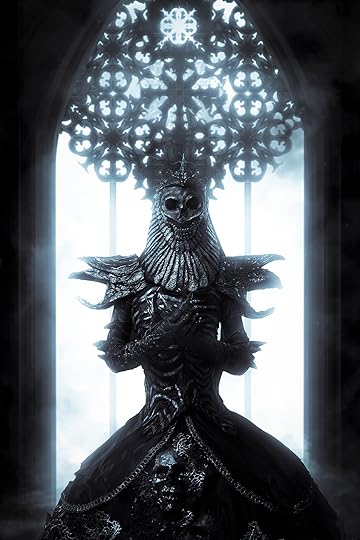







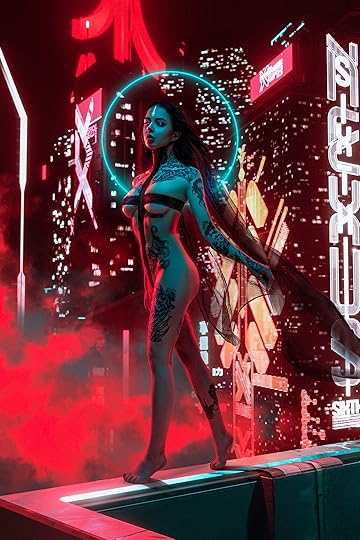

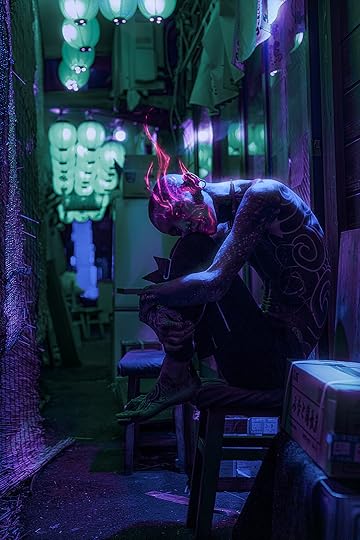




February 3, 2021
February 2, 2021
(Fiction) The Bell Tower
In the 18th year of my exile, I fell in love with a Brabian woman who was neither wholesome nor pleasant but who evinced in me a kind of dread. I had been so long without romance that it seemed my potential for it was waning, and even though I secretly felt I deserved better, it seemed her sudden appearance in the bleak halls of my life was a sign and that if I let her go, I would regret it when someone worse came along. Thus, I was able for a time to faithfully occupy that future state of mind and look on the woman I then courted as if she were the very best that life had to offer. She was flattered at first, although that did less than I expected to hold her attention, but by the start of our second year of courtship, by which time I had promised to marry her, she came to intuit that I still harbored secret dispositions. She attributed my false affection to desperation rather than melancholy, and I came home one day to find a statue in flesh occupying my front door. When I protested, out of arm’s reach, that this brute was in my apartment, I was told he was the younger brother of my betrothed, who that day had married another man.
Her elder brother shouted this to me from inside as he went about loading a pair of suitcases, one of which was my own, with everything feminine he could find, along with anything of any real value. The fact I was a foreigner made finding work difficult, and I had been living for many months on others’ good graces. It was therefore not theft, my betrothed’s brother explained to me as he stuffed a pair of antique kratchniks, the only heirlooms of my family, into my suitcase. Rather, it was the collection of a debt and would be explained as much to the authorities, if I wished to involve them. I was assured my betrothed’s brothers did not and that it would be better for everyone if I simply left town. It didn’t seem possible, but I was being exiled from exile.
After they left, I emptied my pockets at the corner restaurant and sulked at a small round table as the mirrors behind the bar and in the little alcoves in the wall, which I had never before much noticed, mocked me with my own discountenance. I had no money, having just poured the last of mine into a glass, and no place to live, and I wondered at the possibility of suicide. I did not seriously contemplate it. I contemplated whether I had the guts for it, or for anything for that matter. And when the reflection at the bottom of my empty glass jeered at me that the answer was no, I felt a great shame and set out then to prove the bastard wrong. I scaled the spoked fence of the Astraggia, tearing my suit in the process, and climbed the steps to the bell tower, where I intended to fall off swiftly and with no drama. I had decided that if I closed my eyes and let myself fall backward, then I would see nothing of the ground that waited for me and thereby gain a moment on my nerves. By the time they inevitably failed, there would be nothing left to grab and I would be committed in my endeavor as I had been rarely committed to anything.
I was dismayed, however, to find no less than four other fellows already standing atop the bell tower, one on each wall. It being a narrow structure, there was no place left for me. I don’t know who arrived first nor how long any of them had stood there, but after a short wait, it became clear the line was in no danger of moving soon, and I began to shift my weight and make small sounds of annoyance. Who were these fools selfishly siphoning the resolve I had drained so many glasses to find? The longer I waited, the surer I was to fail at this too. So, I coughed and cleared my throat to break the pre-dawn silence and remind each of them that there were people waiting.
After some twenty minutes, I heard the sound of heavy panting behind me, and a plump man appeared, dabbing his brow with a handkerchief. And yet, he seemed to have lost a great deal of weight recently as the suit he wore hung off him indecisively. We made brief eye contact, and it seemed he was not the least bit surprised or bothered that there was a line for that platform of death. Reading the look of incredulity on my face, he explained to me that there was often a line of Thursdays. This intrigued me, and after I wondered aloud at the cause, we began to speculate. Fridays seemed unlikely, we agreed, seeing as how they were the start of the weekend. If one was going to kill oneself, there was no point in doing it on the eve of leisure. Sunday evening, then, seemed the next logical choice. But Sunday was the Lord’s day, and suicide a sin. I admitted that such a thing would even give pause to the unbeliever, such as myself, if only on logic. Since waiting until morning cost nothing, it was worth the price to mitigate even the remotest risk. Besides, after having enjoyed a couple days off, there would likely be some semicolon of doubt inserted into the sentence of one’s life. What harm was there in returning to work on Monday, if only to prove to yourself that you genuinely wanted it to end?
We were just beginning our analysis of Tuesdays when we were asked by one of the fellows on the wall if we wouldn’t mind taking our conversation elsewhere, which we did. My portly friend was not, it seemed, in nearly as dire straits as I, and he took me to an all-night café by the sea where sailors nurtured hangovers and prostitutes wandered about tempting their last pennies from them. We found a table near the back door with a fine view of the dock. Ships rocked and ropes creaked as my friend confided over drinks that he was a merchant clerk who had, against the law, secretly invested heavily in one of his employer’s adventures. They had received word that afternoon that the ship had sunk off the coast of Astartia, possibly as a result of native attack, and that as such the matter was being investigated by the authorities, who were sure to find evidence of his malfeasance. Not only was he broke, he was about to lose his livelihood and go to jail. He was newly married, he explained, and had only succumbed to foolishness in order to provide for his wife, who had been hinting for weeks that she might be with child.
Well, of course my skin prickled at his words, and I asked him to tell me more about his wife. Was she not a kind woman, gracious of spirit, who would forgive him this first folly on account of its noble cause? No, he explained. His wife was a tight-fisted Brabian who had only recently, and finally, left the house of another man, who was apparently a foreigner, like myself, and quite handsome, but also feckless and whining and not at all like the courageous man who stood resolute on the bell tower, ready to throw himself off.
I asked my new friend what he intended to do, now that his life was over, and after turning to ensure we were not overheard, he lowered his head to the table and admitted to me he had not gone to the bell tower to commit suicide but to find a man such as myself who was possessed of nothing in the world but the strength to do it. As a clerk of soon-to-be-ill-repute, his only hope of avoiding a lengthy jail sentence was to capitalize on the secret he alone was prepared to reveal. His employer, while speaking to the admiralty in his office, had let slip within earshot of the door that there had been a great deal of Atlantium on board, and that the captain had orders to dump it at the first signs of trouble. It would not, therefore, be found on the reef with the wreckage, but likely further out to sea. The clerk had been ordered to gather all materials on the voyage and deliver them to the admiralty that very day, which he had, but not before copying a single thin strip of paper into which a series of holes had been punched. The holes were of two sizes, and their varied order revealed information from radio burst that only a trained man could read. It was the ship’s last transmission, and since it would take the admiralty a few days to analyze and reconstruct the information in the file, which had been provided somewhat out of order, there was more than enough time to steam their way ahead of the navy and recover the Atlantium!
I objected immediately that the admiralty of any nation would never let such a prize simply disappear, but my friend was undeterred. It was not necessary, he explained, to retrieve the entire shipment. A single case would more than suffice to turn us both into kings. Since it had been dumped at depth, and since the bulk of the shipment remained, the navy would never assume theft. The loss of a single case would be blamed on the sea. After all, the crew were all dead, and the navy had no reason to expect anyone but the clerk’s employer knew of the vessel’s secret cargo. And in any case, what did it matter to me? Was I not the courageous man who moments before stood ready to throw himself from the top of the bell tower? What was a few days more to the staunch captain of his own fate? Was not the manner of my death a matter of my choosing and mine alone? If the adventure was successful, I would have reversed my fortunes in so grand a manner as to make life itself unrecognizable. And if it failed, the bell tower would remain.
I did not accept immediately but sat watching the ships rocking at dock. A wind had arrived and it sprinkled drops of rain on the flagstones. Was it possible this was an accident? Was it possible the man across the table really was my betrothed’s new husband? Was it possible she had told him that I had once been a diver of some skill, before the scandal that brought me to my exile-upon-exile? It seemed both unlikely and not. The face of my plump companion revealed all of his excitement—it could not contain it—but no subterfuge. And yet, it didn’t seem possible that such a scheme was his. Was there a prime mover?
I lifted the glass I had barely touched and drained it in one go, catching my reflection in the bottom as I slammed it resolutely to the table. Fate, it seemed, was toying with me. That was vexing. But it was also exhilarating. It seemed that whatever plans existed, they depended greatly on me climbing that clock tower to find all the exits barred. I was not, as I had thought, a courageous man at all, and that bled the act of even the faintest nobility. But was I any better for accepting the path that had been laid for me? Should I not refuse—stand and walk out that very moment and find the steps of an old church on which to curl up for the night?
I looked again at the gathering wind. Over the sound of the waves, I heard the distant rime of the bell tower, calling the penitent home.
Was there a bed, I asked, and was answered in the affirmative. It would be so much easier to be courageous, I realized, after a good night’s sleep, and a wise man would attempt it then.
And that is how I set to sea on the voyage that changed everything.
January 31, 2021
(Art) Retrofantasy Computing
The other day on social media, I shared a newspaper article on the rising hobby of retrocomputing, or bringing old computers back to life. After 3D printing turns to micromanufacturing, retrocomputing will give rise to retrofantasy computing, or bringing computers that never existed to life.
Click for larger images.





art by Rust Shake








art by Cem Tezcan

art by Alex CM


art by Joshua Dailey


art by Patrick Metz

art by Sam Wallsworth
January 29, 2021
(Fiction) The World-Walker

He put his hands on the antique oak counter. “This is a book shop. Not a help desk.” He pointed to the sign high on the wall behind him:
THIS IS NOT A LIBRARY
“I’d recommend Massius Crane’s seven-volume history,” he said. “At the end, you might begin to have some faint appreciation for just how immense a question—”
“Fine,” I said, turning to leave. “Whatever. Say hi to Granny for me.”
I made it halfway to the door.
“Wait.”
I turned.
He had a very slight sneer of disgust. “You’re a devil whose name escapes me.”
I waited.
He moved his lips again like he had the same bad taste in his mouth. Then he walked around the counter and to the front, where he locked the door and hung the CLOSED sign. He stepped to the glass-encased bookshelf against the left wall, lifted the keys from his belt, and unlocked it. I watched him remove a large text from a set, the second in a series of seven oversized volumes with old-style cloth binding. The spines all had the title, The Reign of The Masters, printed in metallic gold letters over the name of the author, Massius Crane. The final volume was quite a bit thinner than the others, as if unexpectedly short.
“When they showed up, in secret,” he said, “on a small island in the Adriatic, they would have been wearing heavy robes and John Knox caps. The local workers who lit their path with torches would have been told not to speak of their arrival, upon pain of death.”
Anson brought the tall book to the counter and flipped through the pages slowly. “Mr. Crane suspects their aims were modest—at first. Just as Jesus did not set out to establish the Roman Catholic Church, neither did the five old men who wandered up the rocks that day seek to change the world. They were merely answering the call of the most powerful monarch in Europe at the time, Philip IV of France. The so-called Iron King.”
“Iron?”
“Philip had just executed the last members of what had once been the preeminent military force across the Mediterranean world, and a threat to him: the Knights Templar. The king’s men immediately descended on the Templars’ secret fortress, hidden on that small island, and emptied the treasury, but they were Christian men with Christian spirits and what they found in the lower crypts both perplexed and terrified them, and none dared enter.
“So The Iron King sent for the wisest men from across Europe, Russia, and the Middle East. Nine men. One refused due to ill health, two perished en route, and one turned back when he heard news of their deaths, which he took to be an ill omen. So it was that only five stepped from the rowboat that took them ashore, where the illiterate Italian peasants who greeted them felt obliged to show respect to their superiors, as was the custom of the day. But since they hadn’t been told a proper title, it all being a terrible secret, the peasants referred to the men with the simple honorific of their language, i maestri.”
He spun the book and pointed to a black-and-white illustration, like something from the Victorian era. It was a grand stone chamber. Great columns ran along the sides and held up the heavy roof, all but a shadow overhead. At the end was an impressive stone edifice, like a freakishly tall judge’s bench, behind which sat seven robed elders, the one at the center a little higher than the others. Above them on the back wall, an eye-shaped cavity had been cut into the otherwise smooth stone. Inside it, just a bit off center, a giant crystal radiated spearlike shards in all directions.
“What’s that?” I pointed to the top of the image.
“The source of their power. The Great Eye, forged at the dawn of civilization, two and a half millennia before Christ, by the high priests of Sumer for their lord, Annemundu, the first god-emperor in history.”
I looked closer. “What are these rays coming out?” I traced a finger along one.
“The Eye is—or rather was—a seeing stone, a great crystal whose gaze pierced all. Annemundu used it to discover and destroy all who plotted against him—or even maligned his name in secret. He despised deliberation and enforced a uniform order, a perfect orthodoxy without argument or dissent, where everyone agreed on everything. He called it peace, for there were none left to oppose him.
“Stone carvings from the era suggest that Annemundu’s rule was lengthy and absolute, but that in the end, he died, as all men do. Mr. Crane believes that the Eye was smuggled out of Mesopotamia by wealthy families close to the emperor who feared another despot. Some say it was buried in the deep desert and that the men who buried it were buried themselves. But no one really knows. All we know is that it disappeared from history—completely—for the better part of three thousand years, until, in the thirteenth century, it was discovered in the Templars’ crypts. They seem to have stumbled upon its hidden resting place while on holy crusade and taken it as plunder without realizing its purpose or power.
“It was the five maestri, diligently cataloging all the treasures—and terrors—the knights had accumulated over two centuries of conquest in the Holy Land, who finally saw the truth. Whether they feared what the Iron King would do with it, or whether they succumbed to its lure themselves—perhaps both—The Masters, as they were called, soon betrayed their lord. They sent false reports and provided him trinkets and stale relics in place of the mystic hoard they alone now possessed.
“The five forged a brotherhood pledged to protect that hoard from all who would abuse it. And so they did. But . . . as generations passed, their successors grew increasingly restless with mere custodianship. They had learned much from its contents, that’s for sure. At some point, they began modestly referring to themselves as the High Arcane. Soon after, they took to using the Eye. Rarely at first, but with increasing rapacity.
“By the seventeenth century, some four hundred years later, five elders had swelled to seven and included representatives from all the major civilizations on the earth, from the Far East to the New World. Any man who sought power on any continent—not political office, mind you, but real power—had first to earn their favor. The politicians of this world are, or were rather, princes only. The kings had no name. It’s no accident that the men who built the modern world were all members of secret societies steeped in the occult. Many of the Founding Fathers of this very country were inducted into the secret order of the Masons, pledged vassals of i maestri. Those who resisted, or simply opted out—the remaining woodfolk, the night maidens, the free practitioners of wildcraft—were labeled witches and burned alive.” He looked to me for a reaction.
“Why?” I scowled. “Power?”
“We all want what we don’t have,” Anson explained. “The Masters had power. What they wanted was order.”
He closed the book and retrieved another from the shelf, a later volume in the same series. He flipped to another page. “Here.”
It was like a scene from an old epic, the Iliad or the Ramayana or something. I saw an army of men carrying round shields and snub swords, a line of archers, flying monsters, an army of skeletons erupting from the earth, a giant bull raging through the clouds, a mounted king, a lightning bolt from the sky striking a giant three-tailed scorpion, a magic hammer, a blind priestess, a bearded wizard and his seven acolytes, and on and on, all locked in a great conflagration that filled a long swooping valley from mountain to mountain, while at the peaks, standing rings of fire—one white, one black.
“The world as it was in the beginning,” he said as I studied the page. “You think it’s an accident that every ancient civilization, from the Greeks to the Japanese, told stories of ghosts and monsters and great heroes with magic spears? How do you think Alexander conquered the world? Or Genghis Khan? With the stirrup and a handful of sweaty barbarians? Magic is power. Real power. Over the self above all. It is a way to touch the divine, for whom magic is blood, to participate in something higher, something real, ineffable, transcendent.
“And The Masters took it all. They used the Eye to discover objects of power, then sent their agents to collect. In place of magic, they gave mankind the Machine. Machines are predictable, you see. They can be controlled—measured and changed. But magicks defy periodicity. They’re immeasurable, uncontrollable. And accessible. Remember, Merlin was a peasant boy, and he crowned a king.”
“So what happened?”
“For a long time it seemed as though the High Arcane would rule forever. Until . . . in the aftermath of the war, driven by greed, men penetrated the last soft places of the world. Out of the clear-cut jungle—out of nowhere—a young man appeared, half naked, with ocher skin and eyes painted in blue dye, born of a people spared the ravages of history. A man who could make magic. Not the repetition of some crusty old spell, mind you. Real magic. New magic.”
He slid the creased computer printout over the book.
I looked at it, at the face hidden by a tree. “So . . . this guy’s a wizard?”
“NO!” Anson slapped the counter. “Have you been listening? He’s not a wizard! He doesn’t build flying contraptions and anoint lusty fools with magic swords. He’s a shamanic sorcerer! A world-walker. A true agent of chaos. The very last, in fact. Which is why everyone has been happy to leave him locked away in his sanctum all these years.”
I squinted at the photo. “Then why come out now?”
Anson simply shook his head. “I’m sure I wouldn’t want to know.”
Snippet from my five-course occult mystery, FEAST OF SHADOWS.
cover image by Ryan Lowe
January 28, 2021
(Morning Thought) The $treet
My buddy in Japan asked me what was going on. This was my description — and why it matters.
During the pandemic, a hedge fund called Melvin Capital was short-selling stock of video game retailer GameStop. Melvin believed the company was on shaky footing, that more gamers were buying games and consoles online and that GameStop would be caught in the general retail slump. Melvin set out to profit from this distress.
They did this by short-selling GameStop stock. In a short sale, an investor bets on the price of a stock going down rather than up. They borrow shares and give their owners an IOU. If GameStop is selling at $25 a share, and you want to buy, then you give Melvin $25 and they give you a borrowed share which they must later replace. If, at the time they have to return the share, it is trading at $15, then they have made $10 profit. You paid them $25 for a borrowed share that only cost them $15 to replace.
But Melvin didn’t simply short-sell GameStop. They short-sold 120+% of GameStop stock. In other words, they offered more shares of the company than actually existed. By the law of supply and demand, when supply increases, price decreases. But when the price of stock decreases, people tend to sell, which decreases the price even further. Using their vast assets, Melvin over-sold GameStop stock and effectively drove the price from $25 to $3 per share, where it was still falling.
But rather than close their position at $3 and take their profit, Melvin got greedy. I expect their endgame was to drive GameStop out of business. If so, GameStop shares would be worthless and Melvin wouldn’t have to give anyone anything. They could keep all the money people had given them and tear up all the IOUs.
Some “retail traders” took note of this. A “retail trader” is a home investor, someone who uses a retail trading service like Robinhood or TD Ameritrade to invest, as distinct from an “institutional investor” like Melvin. A retail trader is an average Joe, and the average Joes on a Reddit forum called r/WallStreetBets (created in 2012), many of whom were gamers, took note of the GameStop situation and came to a different conclusion than Melvin.
They believed that yes, the company was hurt by the retail slump, but that it wasn’t dead, that it could still service customers in some areas, and so was worth more than $3 a share. They were also angry that a company like Melvin, with over $13 billion in assets under management, was trying to profit from others’ economic distress and that their plan, if successful, would put people out of work. They began to buy GameStop shares and to tell each other about it on r/WallStreetBets.
Over the course of several days, because so many people were buying small numbers of shares — many of the individual investments were in the hundreds rather than thousands of dollars — the price of GameStop stock increased dramatically, and the guys on r/WSB realized they had the chance to do the seemingly impossible: to drive a multi-billion-dollar hedge fund out of business. They set out to do to Melvin what Melvin was doing to GameStop. They urged each other to buy as much stock as possible and drive the price higher.
To temporarily cover the cost of their IOUs, which were now very expensive, Melvin took a $2 billion loan from a pair of investment houses, who expected the storm to pass. (One of them, Citadel, seems to control trading app Robinhood.)
It didn’t. Yesterday morning, after mogul Elon Musk tweeted the stock, the price of GameStop shot up from $146 to $352 per share, forcing Melvin to sell some of their other positions in order to cover the losses they were incurring. There was blood in the water!
Almost immediately, retail trading houses Schwab, Merrill, Robinhood, and TD Ameritrade began suspending GameStock trades (along with AMC and other stock also targeted) and in some cases freezing the accounts of the r/WSB traders, who could no longer access their portfolios. The average Joes could do nothing but sit and watch as the price of GameStock drifted swiftly down–
In other words, the funds and trading houses are now betting that fines and judgments will be orders of magnitude less than losses. They’re using class action as an asset haven.
There’s an old saying: Any law whose violation is punishable by fine is only a law for the poor. For anyone else, it’s just a fee.
To put this into context, this marks the second time this month that the barbarians stormed the castle. (The first was on January 6th.) This time, however, they actually came away with some loot. The damage may be in the billions.
As I’m writing this, the story is not over. A class action was filed against Robinhood in New York this morning, and one or two trading houses seem to be allowing trades again. After dropping like a rock to $126, GameStop is trading at $230, and no one is quite sure what will happen next.
The $treet
My buddy in Japan asked me what was going on. This was my description — and why it matters.
During the pandemic, a hedge fund called Melvin Capital was short-selling stock of video game retailer GameStop. Melvin believed the company was on shaky footing, that more gamers were buying games and consoles online and that GameStop would be caught in the general retail slump. Melvin set out to profit from this distress.
They did this by short-selling GameStop stock. In a short sale, an investor bets on the price of a stock going down rather than up. They borrow shares and give their owners an IOU. If GameStop is selling at $25 a share, and you want to buy, then you give Melvin $25 and they give you a borrowed share which they must later replace. If, at the time they have to return the share, it is trading at $15, then they have made $10 profit. You paid them $25 for a borrowed share that only cost them $15 to replace.
But Melvin didn’t simply short-sell GameStop. They short-sold 120+% of GameStop stock. In other words, they offered more shares of the company than actually existed. By the law of supply and demand, when supply increases, price decreases. But when the price of stock decreases, people tend to sell, which decreases the price even further. Using their vast assets, Melvin over-sold GameStop stock and effectively drove the price from $25 to $3 per share, where it was still falling.
But rather than close their position at $3 and take their profit, Melvin got greedy. I expect their endgame was to drive GameStop out of business. If so, GameStop shares would be worthless and Melvin wouldn’t have to give anyone anything. They could keep all the money people had given them and tear up all the IOUs.
Some “retail traders” took note of this. A “retail trader” is a home investor, someone who uses a retail trading service like Robinhood or TD Ameritrade to invest, as distinct from an “institutional investor” like Melvin. A retail trader is an average Joe, and the average Joes on a Reddit forum called r/WallStreetBets (created in 2012), many of whom were gamers, took note of the GameStop situation and came to a different conclusion than Melvin.
They believed that yes, the company was hurt by the retail slump, but that it wasn’t dead, that it could still service customers in some areas, and so was worth more than $3 a share. They were also angry that a company like Melvin, with over $13 billion in assets under management, was trying to profit from others’ economic distress and that their plan, if successful, would put people out of work. They began to buy GameStop shares and to tell each other about it on r/WallStreetBets.
Over the course of several days, because so many people were buying small numbers of shares — many of the individual investments were in the hundreds rather than thousands of dollars — the price of GameStop stock increased dramatically, and the guys on r/WSB realized they had the chance to do the seemingly impossible: to drive a multi-billion-dollar hedge fund out of business. They set out to do to Melvin what Melvin was doing to GameStop. They urged each other to buy as much stock as possible and drive the price higher.
To temporarily cover the cost of their IOUs, which were now very expensive, Melvin took a $2 billion loan from a pair of investment houses, who expected the storm to pass. (One of them, Citadel, seems to control trading app Robinhood.)
It didn’t. Yesterday morning, after mogul Elon Musk tweeted the stock, the price of GameStop shot up from $146 to $352 per share, forcing Melvin to sell some of their other positions in order to cover the losses they were incurring. There was blood in the water!
Almost immediately, retail trading houses Schwab, Merrill, Robinhood, and TD Ameritrade began suspending GameStock trades (along with AMC and other stock also targeted) and in some cases freezing the accounts of the r/WSB traders, who could no longer access their portfolios. The average Joes could do nothing but sit and watch as the price of GameStock drifted swiftly down–
In other words, the funds and trading houses are now betting that fines and judgments will be orders of magnitude less than losses. They’re using class action as an asset haven.
There’s an old saying: Any law whose violation is punishable by fine is only a law for the poor. For anyone else, it’s just a fee.
To put this into context, this marks the second time this month that the barbarians stormed the castle. (The first was on January 6th.) This time, however, they actually came away with some loot. The damage may be in the billions.
As I’m writing this, the story is not over. A class action was filed against Robinhood in New York this morning, and one or two trading houses seem to be allowing trades again. After dropping like a rock to $126, GameStop is trading at $230, and no one is quite sure what will happen next.



